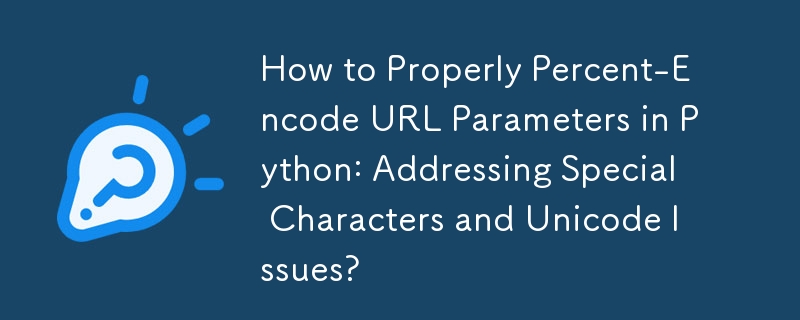

How to Percent-Encode URL Parameters Effectively in Python
When attempting to percent-encode URL parameters using Python's urllib module, you may encounter issues with special character handling and Unicode support. To address these challenges, consider using urllib.parse.quote, which offers greater flexibility and functionality.
Handling Special Characters
The urllib module's quote function doesn't encode forward slashes ("/") to "/," which can disrupt OAuth normalization. To fix this, specify an empty string for the safe parameter:
<code class="python">import urllib.parse
encoded_parameter = urllib.parse.quote("/test", safe="")
# Output: %2Ftest</code>Supporting Unicode Characters
To handle Unicode characters, encode them as UTF-8 before percent-encoding:
<code class="python">unicode_parameter = u"Müller".encode("utf8")
encoded_parameter = urllib.parse.quote(unicode_parameter)
# Output: %C3%9Cller</code>Decoder the encoded parameter using UTF-8:
<code class="python">decoded_parameter = urllib.parse.unquote(encoded_parameter).decode("utf8")
# Output: Müller</code>Alternatives to Consider
Consider using urllib.parse.urlencode to encode multiple parameters as a query string. This function automatically percent-encodes the parameters and handles special characters and Unicode support.
Python 2 Compatibility
For Python 2, the urllib module doesn't adequately handle Unicode characters. As a workaround, you can encode them as UTF-8 before using quote:
<code class="python">query = urllib.quote(u"Müller".encode("utf8"))
# Output: %C3%9Cller</code>The above is the detailed content of How to Properly Percent-Encode URL Parameters in Python: Addressing Special Characters and Unicode Issues?. For more information, please follow other related articles on the PHP Chinese website!
 How to connect broadband to server
How to connect broadband to server
 HTTP 503 error solution
HTTP 503 error solution
 How to skip connecting to the Internet after booting up Windows 11
How to skip connecting to the Internet after booting up Windows 11
 How to turn on Word safe mode
How to turn on Word safe mode
 The role of html title tag
The role of html title tag
 jquery animate
jquery animate
 kb4012212 What to do if the update fails
kb4012212 What to do if the update fails
 What to do if the embedded image is not displayed completely
What to do if the embedded image is not displayed completely
 How to export word from powerdesigner
How to export word from powerdesigner




